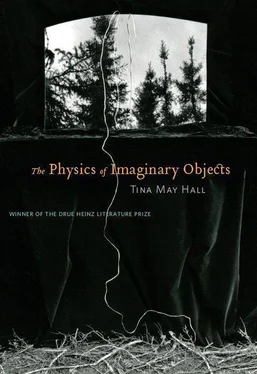Tina Hal - The Physics of Imaginary Objects
Здесь есть возможность читать онлайн «Tina Hal - The Physics of Imaginary Objects» весь текст электронной книги совершенно бесплатно (целиком полную версию без сокращений). В некоторых случаях можно слушать аудио, скачать через торрент в формате fb2 и присутствует краткое содержание. Год выпуска: 2010, Издательство: University of Pittsburgh Press, Жанр: Современная проза, на английском языке. Описание произведения, (предисловие) а так же отзывы посетителей доступны на портале библиотеки ЛибКат.
- Название:The Physics of Imaginary Objects
- Автор:
- Издательство:University of Pittsburgh Press
- Жанр:
- Год:2010
- ISBN:нет данных
- Рейтинг книги:5 / 5. Голосов: 1
-
Избранное:Добавить в избранное
- Отзывы:
-
Ваша оценка:
- 100
- 1
- 2
- 3
- 4
- 5
The Physics of Imaginary Objects: краткое содержание, описание и аннотация
Предлагаем к чтению аннотацию, описание, краткое содержание или предисловие (зависит от того, что написал сам автор книги «The Physics of Imaginary Objects»). Если вы не нашли необходимую информацию о книге — напишите в комментариях, мы постараемся отыскать её.
The Physics of Imaginary Objects,
The Physics of Imaginary Objects — читать онлайн бесплатно полную книгу (весь текст) целиком
Ниже представлен текст книги, разбитый по страницам. Система сохранения места последней прочитанной страницы, позволяет с удобством читать онлайн бесплатно книгу «The Physics of Imaginary Objects», без необходимости каждый раз заново искать на чём Вы остановились. Поставьте закладку, и сможете в любой момент перейти на страницу, на которой закончили чтение.
Интервал:
Закладка:
The story of the bird didn't seem to upset Paul. He said it was the change of seasons and he'd seen it happen before. He said Phoenix was still hot and fragrant with bougainvillea and chives. He said the woman who ran the bed-and-breakfast had a wonderful yard filled with stones and cacti and tropical blossoms. I asked when he was coming home. The conference was over, but he was learning about conifers and water conservation from a soil engineer he had met there. I reminded him winter was coming.
Paul had moved in during the summer, and the first thing he did was plant a ribbon of hyssop that smelled of licorice and drew the bees. Next, he planted a vegetable garden in the backyard, at the edge of the forest. He said it was too late to plant anything but kale and radishes — bitter, earthy things. When he found out I was pregnant, he was angry I wouldn't marry him. He was angry it took me three weeks to tell him and that when I did, I said I was considering my options. From the garden at his own house, which was only two miles away straight through the woods, he brought tomatoes and yellow squash and peas, which he shelled on the porch while I worked downstairs. All things I couldn't bear to eat. I gnawed at bones while he made summer soups and pastas. I could see his feet moving past the high windows at the top of the basement as he dug dozens of holes around the house—”Surprises,” he said, when I asked him about it, things that wouldn't come up until spring.
Wasps came in through the torn kitchen screen. They made their way to the basement and buzzed me as I worked. They were building a nest in the corner of the room, above the water heater, and I didn't bother them because I hoped it might be one of those large paper nests so prized by artists and naturalists that one sometimes found for sale in junk stores. I would have liked to see how such an elaborate home evolved, but it quickly became clear they were just regular wasps building a mud nest. I ventured into the kitchen for the fruit that was rotting on the counter and piled it on my worktable. The two plums and a soft, late-season tomato lured the wasps, and they posed for me, busy and unhurried, as I cut them into the linoleum blocks. I sent those prints to a women's magazine for a story about love betrayed.
Ten days after the squirrel died in my wall, the smell moved into the bedroom, and I gathered up the down comforter and the Mexican blankets and started sleeping in my pickup truck. The mornings were cold enough that when I woke, the windows were misted with frost and the rough fiberglass ceiling of the camper dripped condensation.
One night, while sitting in the back of the truck, bundled in covers that held the faint scent of the squirrel, I argued with Paul and heard my voice echo back through the cell phone, dummy windmills and palm trees working overtime in the expanse of country between us. As I hung up, a large, dark shape moved past the truck toward the house. There were three deer there, sniffing at the kitchen door. One of them butted its head against the wood. The smell of the squirrel rose up around me like the scent of one's own scalp or the hidden folds of one's skin. The deer made odd sounds, muted moans and snuffles, and tapped their noses against the door as if demanding to be let in.
Every now and again, I tested my limits. I went for hours without eating until the sickness was so bad that I could hardly move for the shaking. Then there would be that scrabbling feeling, that little bony body twisting inside me. On the ultrasound, its spine had been a line of seeds, its fingers twigs finer than anything I could have cut.
The radio in the truck ran reports of home invasions, terrorist alerts, deadly viruses — all stories of hospitality abused. The wasps continued to seep into the basement, and the deer showed up each night to scrape at the door. It began to seem there was something gone wrong in the house. I had spent several winters there, and the animals never had acted like this. I couldn't help but wonder if Paul had brought something with him, a ghost or a curse or an unhappy soul. I went through the two cardboard boxes of clothes he was still living out of and found nothing unusual except for a sock of mine. It was from my favorite pair — a fuzzy lurid pink sock with a cartoonish Virgin Mary stitched in blue. I couldn't tell if the sock had dropped into his box by accident or if he had taken it for some reason, maybe to stop me from wearing them around the house all the time, maybe for love. I left it there, tucked into the sleeve of one of his shirts.
The walls in my house were poorly plastered, the joints in the sheets of drywall rising up like veins in the back of a hand. I considered knocking a hole in the kitchen wall myself and entered the kitchen with an old silk scarf tied around my face. The scarf had been my mother's and smelled like one of her drawers of clothing, dust and lemons. In the kitchen, all I could smell was the squirrel. I leaned against the heavy, old, cast-iron stove but couldn't budge it. The woman I bought the house from had told me the stove used to sit away from the wall to leave space for a box where she slept as a child through the northern winters. A dangerous practice, I had thought at the time.
At night, the baby was particularly active, twisting and squirming inside me. If I spoke or sang, it stilled. I liked it for its caution. I always piled the blankets highest around my middle, even if it meant my feet grew chilled. I sang colors to counteract the onset of gray winter. Cadmium yellow, brown madder, cerulean blue, I whispered, invoking pause.
It snowed again, and I shut the windows to prevent water damage to the wood floors. There was nothing to do but to call the contractor in town. He said he'd send his cousin who had come down from Canada to work through the winter. His cousin was an artist, he said, a master of restoration, and I explained I just needed a hole, an extraction, and a patch, nothing fancy. Really, I just needed someone to help me move the heavy parts of my house, but I didn't want to admit that Paul was still in Phoenix, under the spell of succulents and irrigation systems.
The cousin was older than I had expected, in his late thirties, and I wondered what kind of life he had in Canada that he could leave behind for months at a time. He went unerringly to the wall in the kitchen and stood looking at it, still in his coat and leather work gloves. I apologized for the heat being off and gestured at the wall, the smell, in explanation. Together, we moved the heavy stove and he took off his gloves, placed them carefully in the pockets of his coat, and kneeled to put his bare hand on the plaster. He said he'd have to leave the wall open for a while to air it out, but that he would come back and patch it so perfectly that no one would guess it had ever been touched. I looked at the snowflakes melting in his hair and without knowing why, placed my own hand at the back of his neck, just at the point where his hair met the corduroy collar.
The kitchen table was just as hard and uneven as I had thought it would be, and I worried about splinters, even while enjoying the warmth of him against my ribcage and thighs. He was slow and silent and didn't seem to notice the solid bulge of my belly. A minor restoration , I thought as I breathed against his stubbly throat. My fingers measured the ridges of his collar as he moved over me. From that angle, I could see how the aged glass of the windows was much thicker at the bottom than the top, and it seemed for a moment that I could see it slide downward, cloudy, viscous, sinking under its own weight.
When the contractor's cousin finished cutting the hole in the wall, he called to me to come see what he had found. Instead of one squirrel, there were twenty or so, twined around each other, decaying into one mass. They had obviously followed each other down into the space and had not been able to find their way back out.
Читать дальшеИнтервал:
Закладка:
Похожие книги на «The Physics of Imaginary Objects»
Представляем Вашему вниманию похожие книги на «The Physics of Imaginary Objects» списком для выбора. Мы отобрали схожую по названию и смыслу литературу в надежде предоставить читателям больше вариантов отыскать новые, интересные, ещё непрочитанные произведения.
Обсуждение, отзывы о книге «The Physics of Imaginary Objects» и просто собственные мнения читателей. Оставьте ваши комментарии, напишите, что Вы думаете о произведении, его смысле или главных героях. Укажите что конкретно понравилось, а что нет, и почему Вы так считаете.












